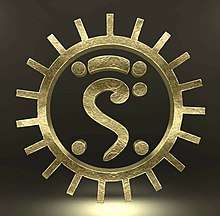Emoinu
Emoinu (Meitei: ꯏꯃꯣꯏꯅꯨ) is the Manipuri goddess of hearth, home, family, wealth, peace, fertility, wisdom, prosperity, vitality, resources and the right ordering of domesticity.[1][2]

| Emoinu ꯏꯃꯣꯏꯅꯨ | |
|---|---|
Goddess of hearth, home, family, peace, fertility, wisdom, wealth, vitality, resources and prosperity Mother goddess | |
| Other names | Thumleima, Phouoibi, Nga Leima, Irai Leima, Leimarel Sidabi, etc. |
| Affiliation | Sanamahism and Manipuri mythology |
| Abode | Sanamahi Kachin (Household kitchen, near the stove) |
| Mantra | ꯎꯡ ꯔꯩ ꯔꯦ ꯍꯌꯥ ꯍꯌꯥꯔꯦ! ꯍꯥꯗ ꯏꯃꯥ ꯁꯤꯗꯕꯤ ꯏꯃꯣꯢꯅꯨ ꯑꯍꯣꯡ ꯑꯆꯥꯎꯕꯤ ꯫o꯫
Ung Rei Re Haya- Hayare! Hada Ima Sidabi Imoinu Ahong Achaubi ꯫o꯫ |
| Symbol | Phungā Lairu (hearth), Chengphu (rice pot), Senphu (wealth pot), Yotshabi (tripod) and Hidakphu (hookah). |
| Texts | Malem Chakkhong PuYa, Yumsharol, Konthoujam Nongarol, Emoinu Mingkheirol, Emoinu Tengtharol |
| Gender | female |
| Region | Manipur |
| Festivals | Imoinu Iratpa |
| Greek equivalent | Hestia |
| Roman equivalent | Vesta (mythology) |
| Hinduism equivalent | Mahalakshmi |
In Manipuri mythology, Emoinu is known for her sense of humor. Generally, she is portrayed as "an old woman", as her name means "great grandmother" in Manipuri language.
Ancient texts
There are many ancient texts which mentioned the description of the deity. A few of them include "Emoinu Tengtharol", "Emoinu Mingkheirol", "Yumsharol", "Malem Chukkhong Puya" and so on.
Etymology
The name Emoinu stands for the goddess rearing the human beings. The first-word syllable E means human beings, moi meaning rearing and nu meaning Goddess.[3]
Ahongbi means giver of the household properties plentifully. Ebendhou meaning great-grandmother.[4]
Legend
There are two legends about the origin of the goddess Emoinu.
- The first legend is mentioned in ancient Meitei Manipuri text "Lairembi Nongumlol".
According to the text, the Sky God Salailen Sidaba has seven daughters, whom he sent them down to earth to prosper the human civilization. All the goddesses were given a certain task to serve in their future. In that event, a goddess was given the task to be the mother of peace, wealth and prosperity. Later, she was named "Emoinu Ahongbi".
- According to the second legend, Creator God Atingkok Maru Sidaba asked his consort, the earth goddess Leimarel Sidabi to produce another goddess in her exact copy. So, she did. The new goddess was named Emoinu Ahongbi and was sent to earth to be the goddess of peace, wealth and prosperity. Besides, she is the Guardian of the mankind.[5]
Divine forms
She has various divine forms. Some of them are:
- Leimarel Sidabi: Earth goddess
- Panthoibi: War goddess
- Phouoibi: Food goddess
- Ngaleima: Fish goddess
- Thumleima: Salt goddess
Festival
Imoinu Iratpa is observed every 12th day of the Meitei lunar month, Waakching (Dec-Jan in gregorian calendar).[6][7] On this day, especially at night, Emoinu is offered what each can, particularly fish curries as dinner for Emoinu and a variety of cuisines in odd numbers.[8]
Worship
Abode
There are two major places in a household where the deity could be worshipped:-
- One abode is at the fireplace "Phunga Lairu" of the kitchen of the household.
- Another place is at the "Sanamahi Kachin", the South western corner of the household.
Ritual
Ebendhou Emoinu is offered from the first serving of every meal prepared in a Meitei household. The serving is made by placing three servings of the cooked rice on a plate that is set aside. These offerings should be only vegetarian foods or fish.
The household members are asked to maintain discipline, be respectful, and be tidy so as to please Emoinu.
In popular culture
- A Manipuri feature film Imoinu shows the worship of the deity, alongside the storyline of the film.
See also
- Lainingthou Sanamahi
- Pakhangba
- Atingkok Maru Sidaba
- Lists of deities in Sanamahism
- Lists of Creatures in Meitei Folklore
- Sanamahi creation myth
- Sacred Scriptures of Sanamahism
References
- https://m.telegraphindia.com/states/north-east/meiteis-celebrate-emoinu/cid/1627030
- http://e-pao.net/epSubPageExtractor.asp?src=reviews.books.emoinu
- http://e-pao.net/epSubPageExtractor.asp?src=reviews.books.emoinu
- http://e-pao.net/epSubPageExtractor.asp?src=reviews.books.emoinu
- http://e-pao.net/epSubPageExtractor.asp?src=reviews.books.emoinu
- "Observance of festival of Emoinu". E-Pao. Nabakumar Salam.
- http://e-pao.net/GP.asp?src=7..030115.jan15
- https://www.officeholidays.com/holidays/imoinu-iratpa